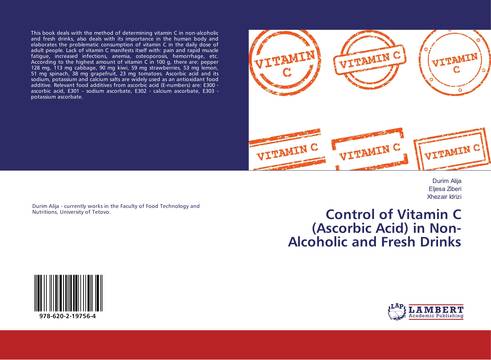
- Natural-, Medical- , Computer Sciences, Technology
- Biology
- Agriculture, horticulture, forestry, fishery, nutrition
- Control of Vitamin C (Ascorbic Acid) in Non-Alcoholic and Fresh Drinks

Control of Vitamin C (Ascorbic Acid) in Non-Alcoholic and Fresh Drinks
The deal will be concluded after the remaining time displayed in the deal has run out. No deal order will be processed before.
Price
35.90 €
26.92 €
|
Group Deal not yet accepted!
10 more copies required |
Discount
25%
|
- ISBN-13:
978-620-2-19756-4
- ISBN-10:
- 6202197560
- EAN:
- 9786202197564
- Book language:
- Blurb/Shorttext:
- This book deals with the method of determining vitamin C in non-alcoholic and fresh drinks, also deals with its importance in the human body and elaborates the problematic consumption of vitamin C in the daily dose of adult people. Lack of vitamin C manifests itself with: pain and rapid muscle fatigue, increased infections, anemia, osteoporosis, hemorrhage, etc. According to the highest amount of vitamin C in 100 g, there are: pepper 128 mg, 113 mg cabbage, 90 mg kiwi, 59 mg strawberries, 53 mg lemon, 51 mg spinach, 38 mg grapefruit, 23 mg tomatoes. Ascorbic acid and its sodium, potassium and calcium salts are widely used as an antioxidant food additive. Relevant food additives from ascorbic acid (E-numbers) are: E300 - ascorbic acid, E301 - sodium ascorbate, E302 - calcium ascorbate, E303 - potassium ascorbate.
- Publishing house:
- LAP LAMBERT Academic Publishing
- Website:
- https://my.lap-publishing.com
- By (author) :
- Durim Alija, Eljesa Ziberi, Xhezair Idrizi
- Number of pages:
- 64
- Published on:
- 2017-12-12
- Stock:
- Available
- Category:
- Agriculture, horticulture, forestry, fishery, nutrition
- Price:
- 35.90 €
- Keywords:
- ascorbic acid, Food Additives, Vitamin C, daily need, lack of vitamin C, E-numbers



















